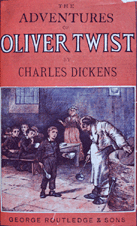 |
Charles
Dickens used slang for various characters in his
novels, as in this (edited) extract from 'Oliver
Twist', written in 1838.
The
story…
The
Artful Dodger and Charley Bates are discussing
stealing with Oliver Twist in Fagin's den. The
Dodger asks Oliver whether he is going to learn
to steal or if he thinks he can depend on his
friends all his life…
|
"Oh,
blow that!"
said Master Bates: drawing two or three silk handkerchiefs
from his pocket, and tossing them into a cupboard,
"that's too mean; that is."
"I couldn't do it," said the Dodger, with
an air of haughty disgust.
"You can leave your friends, though,"
said Oliver with a half smile; "and let them
be punished for what you did."
"That," rejoined the Dodger, with a wave
of his pipe, "that was all out of consideration
for Fagin, 'cause the traps
know that we work together, and he might have got
into trouble if we hadn't made our lucky;
that was the move,
wasn't it, Charley?"
Master Bates nodded assent…
"Look here!" said the Dodger, drawing
forth a handful of shillings and halfpence. "Here's
a jolly life! What's the odds where it comes from?
Here, catch hold; there's plenty more where they
were took from.
You won't, won't you? Oh, you precious
flat!"
"It's naughty, ain't it, Oliver?" inquired
Charley Bates. "He'll come to be scragged,
won't he?"
"I don't know what that means," replied
Oliver.
"Something in this way, old
feller," said Charley. As he said
it, Master Bates caught up an end of his neckerchief;
and, holding it erect in the air, dropped his head
on his shoulder, and jerked a curious sound through
his teeth; thereby indicating, by a lively pantomimic
representation, that scragging and hanging were
one and the same thing.
"That's what it means," said Charley.
"Look how he stares, Jack! I never did see
such prime company as that
'ere boy;
he'll be the death of me, I know he will."
Master Charles Bates, having laughed heartily again,
resumed his pipe with tears in his eyes.
"You've been brought up bad,"
said the Dodger, surveying his boots with much satisfaction
when Oliver had polished them. "Fagin will
make something of you, though, or you'll be the
first he ever had that turned out unprofitable.
You'd better begin at once; for you'll come to the
trade long
before you think of it; and you're only losing time,
Oliver."
…"And always put this in your pipe, Nolly,"
said the Dodger, as the Jew was heard unlocking
the door above, "if you don't take fogles
and tickers
- "
"What's the good of talking in that way?"
interposed Master Bates; "he don't know what
you mean."
"If you don't take pocket-handkechers and watches,"
said the Dodger, reducing his conversation to the
level of Oliver's capacity, "some other cove
will; so that the coves that lose 'em will be all
the worse, and you'll be all the worse too, and
nobody half a h'p'orth
the better… |
Oliver is
being taught the language of the den. He would be feeling
even more left out if the other two did not explain
some words. Several examples of slang are marked in
this passage.
 |
Look
at the words highlighted. Some of them are slang
words (like fogles) and some are only slang in the
way they are used ('trade' usually refers to an
honest occupation). Can you list them in two columns? |
 |
Now copy the text from this page into a word processor.
Replace the red words with other words you know.
Mark which of your words are slang and which are
Standard English. |
 |
Think
about any specialist area you know about apart
from school: a sport, any kind of art, any kind
of music, a business that someone in your family
works in, a subject you read books or magazines
about, shopping, transport, advertising, fishing,
outer space, microbiology, animals… Make a glossary
of some of the jargon words involved which would
help someone else understand. You may need to
add some slang words too.
End
Finish
Finale
Wrap-up
Curtains
Conclusion
Culmination
|
Bitter
end
Close-down
Termination
The end of the Line
The rest is history
The fat lady sings
That's all folks! |
|
|
|